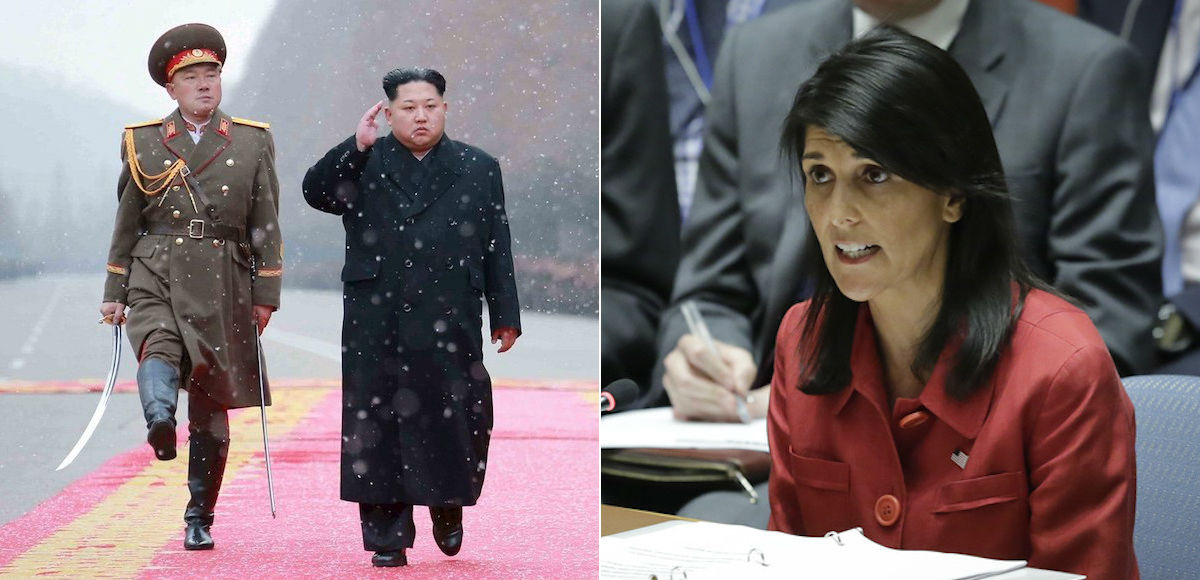

North Korean leader Kim Jong Un, left, and United States to the U.N. Ambassador Nikki Haley, right. (Photos: Reuters/AP)
The United Nations (U.N.) Security Council voted unanimously to impose severe sanctions North Korea over their intercontinental ballistic missile program. Resolution 2371 (2017) specifically cites the last two tests conducted on July 3 and July 28, both of which represented giant steps forward in the program’s capabilities.
It condemns and reminds North Korea of their obligation not to conduct further nuclear tests or test ballistic missile technology.
The U.S.-led resolution will cost the North Korean regime roughly one-third of their exports, totaling more than $1 billion. It contains a ban on its largest export, coal, representing a loss to North Korea of over $401 million in revenues per year. It also bans iron and iron ore exports, costing the leftwing communist regime roughly $250 million per year.
The seafood ban is estimate to cost North Korea roughly $300 million, while the ban on lead and lead ore is worth roughly $110 million.
North Korea’s first successful test of the Hwasong-14 was on July 3. It flew for 37 minutes and reached a height of more than 1,500 miles, or at an altitude of 2,803 kilometers (km), breaking the DPRK’s previous record set on Mother’s Day.
On July 28, Pyongyang conducted its second successful test of the Hwasong-14, the first true intercontinental ballistic missile (ICBM) capable of hitting the United States (US) mainland. It flew for roughly 45 minutes to a range of about 1,000 km and to an altitude of roughly 3,700 km.
Based on the data, the Hwasong-14 could potentially have a range of more than 10,000 km if rotated to fly on a range-maximizing ballistic trajectory. Put plainly, the second test demonstrated it has the capability to reach the U.S. mainland. In fact, its range is far enough to reach the vast majority of the Continental United States (CONUS).
The resolution also places sanctions on North Korean individuals and entities that support the country’s nuclear and missile programs, including the state-owned Foreign Trade Bank (FTB), which officials say acts as their primary foreign exchange bank. It prohibits all new joint ventures or cooperative commercial entities between North Korea and other nations, as well as ban additional investment in existing ones.
As a result of the vote, the U.N. Security Council’s North Korea Sanctions Committee will also be charged with identifying additional conventional arms-related and proliferation-related items to ban to and from North Korea. The committee can designate certain vessels and prohibit their international port access, as well as ask Interpol to publish Special Notices on listed North Koreans banned from traveling.
[brid video=”156360″ player=”2077″ title=”Nikki Haley at UN Security Council Briefing on North Korea”]
The most damning journalistic sin committed by the media during the era of Russia collusion…
The first ecological study finds mask mandates were not effective at slowing the spread of…
On "What Are the Odds?" Monday, Robert Barnes and Rich Baris note how big tech…
On "What Are the Odds?" Monday, Robert Barnes and Rich Baris discuss why America First…
Personal income fell $1,516.6 billion (7.1%) in February, roughly the consensus forecast, while consumer spending…
Research finds those previously infected by or vaccinated against SARS-CoV-2 are not at risk of…
This website uses cookies.